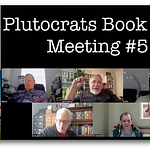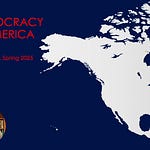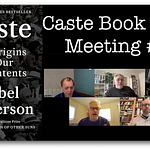This was a little rant I indulged myself in a while back, about Niall Ferguson’s appearance on Lex Fridman’s podcast. I think it highlights some interesting facets of the newly-emerging “alternative education” space. I’d like to avoid a situation where we just have a set of “woke” old institutions and a new set of “anti-woke” but otherwise identical colleges and universities.
Lately I've been listening to Lex Fridman, who is an artificial intelligence researcher associated with MIT. He does long-form interviews like Joe Rogan, but his core group of subjects tend to be scientists rather than comedians and MMA folks. One of the interviews I listened to a couple of days ago was Sara Imari Walker, and it was really smart and fun.
Lex has an attitude toward people and knowledge that is similar to Rogan's. As an interviewer, he seems to want to give his subjects space to voice their opinions and present their points of view and ideas. I'm all for this, because I think it's super valuable to try to understand the perspectives of thoughtful people, even when I disagree with them. Lex recently posted a short YouTube video in which he responded to some criticisms of his apparent difficulty pushing back sometimes He says that Joe's technique is to say something like "Whoa whoa stop. Did you just say what you said?" to make sure he understood and to get the subject to clarify and expand on their point. Lex makes the important point that "sometimes really big negative or difficult ideas could be said as a quick aside in a sentence, like it's nothing. But it could be everything and you want to make sure that you catch that and you talk about it. And not as a gotcha..but to reveal something profound." I couldn't agree more. It's often the things that a person doesn't quite say or mentions as a "given" in an argument that are the most revealing about where they're coming from and what assumptions and biases are baked into their worldview.
Hours after listening to this, I saw an example of it play out in an interview Lex did with the historian Niall Ferguson. Now Ferguson is not a scientist, so Lex can't be blamed for not being entirely able to push back on something Ferguson said that betrayed a significant bias. But as a historian, I feel like I ought to.
The first half of the 2.5-hour interview focused on the new University of Austin, of which both Ferguson and Fridman are founding members. The university is designed, Ferguson says, to address the failures of higher education globally. Now I'm in higher ed, and I'm totally on-board with the idea that it needs fixing. There are tons of things wrong with colleges and universities today, so I appreciate any attempts to seriously deal with them.
Unfortunately, the issue Ferguson seems to be most focused on fixing is "wokeness". Most of the time he devotes to describing the problems of higher ed to Lex, he's not talking about the insane amounts of debt that students accumulate in order to get an education. Or the lack of clear connections between many academic programs and the things the students will do in their careers. Or the inequity of access. Nope. He's very concerned that some people have had their campus talks shut down due to student protests and a few faculty have lost their jobs over their politics.
Now, I don't think anybody should be denied tenure or not hired, much less being let go, for their political positions. I do think it's a bit ironic that Ferguson is a senior fellow at the Hoover Institution and has been publicizing his position in opinion pieces like "I'm Helping to Start a New College Because Higher Ed is Broken" in Bloomberg. When he says in this article that one of the big problems is "Corruption and racial discrimination in admissions", what he means is that too many minorities are being admitted.
Of course, Ferguson didn't come out and say this in his discussion with Fridman (probably because that's an issue which resonates better with Bloomberg's readers than Lex's viewers). But he DOES wax poetic about how people who don' t learn the classics of European literature can't really consider themselves "grown up" or perhaps even fully human. Ferguson then makes an aside which illustrates the point Lex made in his other video.
At about 1:42:36 in the interview, when Lex is asking him about his recent book, Doom, the Politics of Catastrophe, Ferguson says "As far as we can see, [the Bubonic Plague] was history's worst pandemic...the mortality was 30%, in some places 50%." This data is not untrue, but is this THE disaster that "most shook the human spirit", which was what Lex had asked? I'd argue that the Columbian Exchange, the series of pandemics that swept through the Americas in the 16th and 17th centuries after European contact, was worse. From a starting population of probably at least 65 million, 90% to 95% of the natives of the Americas were killed. I think it's worth exploring why this disaster didn't come to mind, when Lex asked Ferguson about shaking the "human spirit"?
Now I'm not saying the Black Death was inconsequential. What I am saying is that Ferguson did NOT say, "As far as we can see, the Bubonic Plague was one of history's worst pandemics". Just as he doesn't say that people in India or China could become "grown up" by reading the classics of Indian or Chinese literature. This may seem like a little thing, but I think it's actually kind of big. It suggests to me that this University of Austin project isn't about openness and avoiding the type of prejudice that sometimes expresses itself as insufferable wokeness. It suggests to me that its leaders are explicitly choosing the European tradition and arguing not only that learning the canonical classics of western civilization will improve students minds (which I agree it will), but that ONLY the European tradition will do that and the rest of the world has nothing to contribute. This isn't just a rejection of wokeness, it's anti-woke.
I respect and embrace the argument that the great works of western art, literature, music, and science are valuable and ought to be studied. But in supporting study of the "Humanities" in higher ed, I'm not going to claim that only the western tradition is "human". Ferguson also mentions (also as a passing aside) that only western Europe "got science right". For a historian, this also seems a bit short-sighted. Where did all the inventions that led to the European Renaissance and the Industrial Revolution come from, Niall? Where did the math, astronomy, navigation, and the printing press originate, again? Because the last few centuries have seen the Europeans and their descendants on top, do you believe that will always be the case? That science will end with the economic of military supremacy of white people? Or art? Or civilization? If that's the case, we're living in the last days. But of course it's not the case. It's a bit ironic, that Ferguson fancies himself a master of "counterfactual" history. Speculating about what would have happened if a particular decision was not taken in the past. I think this is a very cool pastime. But it's one in which you REALLY need to be aware of your assumptions.













Share this post